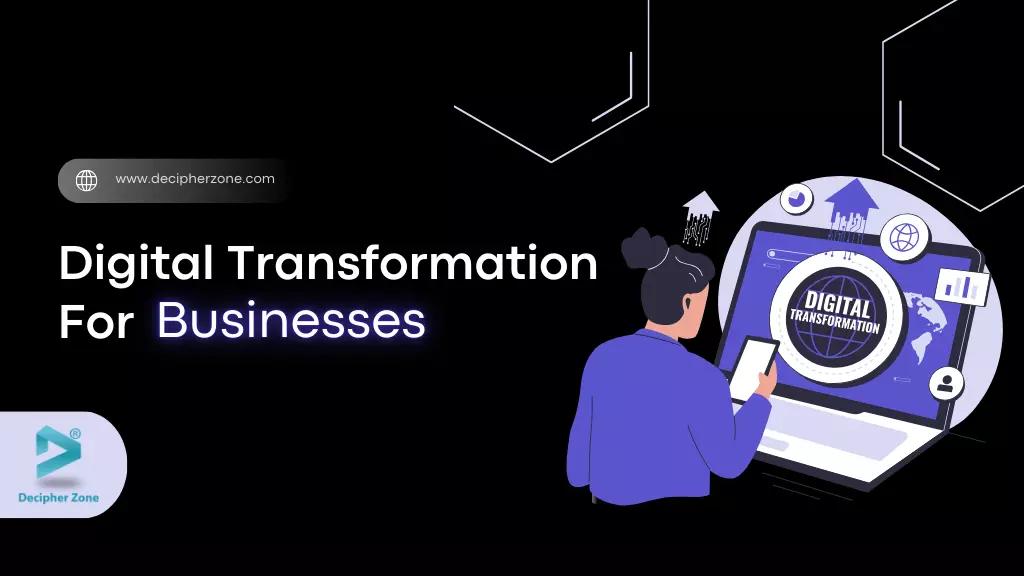Expand your business with digital transformation services before it’s too late. With the latest technologies by your side, businesses can innovate, evolve and grow up to great heights. This article explores in detail from advantages to proven strategies, roles & responsibility, how it impacts particular industries, toolkit, types, to how to choose the right partner you can count on.
Digital transformation has become a business imperative not an option in an age where technology evolves at breakneck speed. According to the latest McKinsey research, a staggering 90% of organizations are currently undergoing some form of digital transformation.
Yet, despite this widespread push toward modernization, success remains exclusive as 70 % of large-scale transformation efforts still fail, often due to poor leadership alignment and weak cross functional collaboration.
But failure isn’t inevitable when done right. Digital transformation can discover new growth, opportunities, streamline operations and completely enhance customer experience. From reimagining how products are delivered to how teams collaborate, the shift touches every corner of an organization.
Today the question is not if companies should transform but it's how. Gartner stated, 91% of businesses are engaged in some form of digital initiatives, but only 40% have achieved scale. This gap points to the importance of going beyond surface-level tech upgrades to drive real, sustainable change.
Whether the transformation is through AI-powered automation, cloud migration or smarter data usage, successful digital businesses prioritize continuous innovation and user-centric thinking. This guide outlines the key components, trends and technologies, types and potential strategies to ensure your efforts don’t end up in the dreaded.
Understanding Digital Transformation Services in 2025
Digital transformation services enable businesses to adapt and thrive in the digital age, leveraging technology to reshape processes, operations and customer experiences. These services are designed to take the headache of digital transformation and ensure that the organization can focus on other important parts of the business which is ‘Strategy’.
Basically, these digital transformation services involve a wide range of solutions such as customer software development, cloud migration, process automation and data analytics. Mainly the goal of businesses is to create a more agile, efficient and customer-oriented organization. Mostly these services are available as per the need basis which means you pay only for the services you require.
Many businesses benefit from using digital transformation tools by:
-
Improved time management,
-
Higher return on investment (ROI),
-
Faster time-to-market for products and services,
-
Enhanced communication and collaboration among teams,
-
Increased digital adoption within the organization,
-
Better customer retention rates,
-
Generating new sales opportunities among others,
By recognizing the importance of digital transformation, businesses can more effectively prioritize and align their transformation initiatives with their specific strategic goals.
Read: Impact of Digital Transformation in the Healthcare Industry
Advantages of Digital Transformation Services in 2025
Here is a list of benefits of digital transformation services:
-
Increases Productivity
-
Improved Customer Experience
-
Streamlined Operations and Increased Efficiency
-
Cost Savings
-
Improved Agility and Flexibility
-
Enhanced Collaboration & Communication
-
Data-Based Decision Making
-
Increased Revenue and Profitability
-
Improved Security
-
Enhanced Competitive Advantage
-
Driving Innovation and Growth
Digital transformation offers several advantages for businesses, such as enhanced data collection, stronger resource management, data-driven customer insights and improved customer experience. It boosts a digital culture, increases profits and agility and enhances productivity.
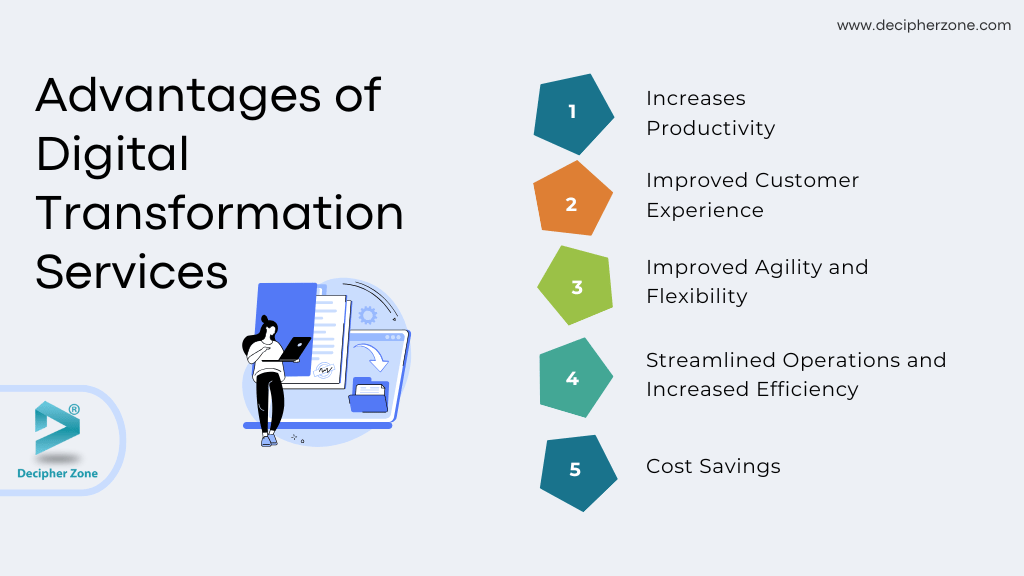
1. Increases Productivity
Using technology to upscale new employees and updating digital resources can be impactful ways to transform your business. This not only lowers the labor costs but also increases productivity and enhances the workforce allowing them to work more efficiently.
2. Improved Customer Experience
Businesses can offer a personalized and engaging customer experience using digital technologies including Artificial Intelligence (AI), Customer Relationship Experiences (CRM), Data analytics tools, mobile applications and social media platforms which leads to increased satisfaction and loyalty.
3. Streamlined Operations and Increased Efficiency
By leveraging digital technologies, businesses can automate tasks, optimize workflows and reduce redundancies. This results in significant improvements in efficiency and productivity.
4. Cost Savings
Digital transformation automates processes, reduces waste and optimizes resource allocation which can lead to substantial cost savings for businesses.
5. Improved Agility and Flexibility
Businesses adapt quickly to changing market conditions, customer needs and emerging technologies using digital transformation services, making them more agile and resilient.
6. Enhanced Collaboration & Communication
Digital tools and platforms provide better communication and collaboration among employees without considering location. This promotes a more connected and collaborative work environment.
.avif)
7. Data-Based Decision Making
Businesses can make more informed and data-driven decisions with access to rich and relevant data. This leads to better strategic planning and operational outcomes.
8. Increased Revenue and Profitability
With improved efficiency, enhanced customer experience and driven innovation, digital transformation can lead to increased revenue and profitability for businesses.
9. Improved Security
Digital transformation helps businesses comply with evolving regulations and standards by automating compliance processes and ensuring data security.
10. Enhanced Competitive Advantage
Businesses can differentiate themselves from competitors by gaining a competitive advantage and staying ahead of the curve enabling digital transformation.
11. Driving Innovation and Growth
By utilizing digital transformation businesses are encouraged to embrace innovation and develop new products, services and business models that foster growth and long-term sustainability.
Top 10 Proven Strategies to Implement and Accelerate Digital Transformation in 2025
Here are high impact strategies to accelerate your digital transformation journey and deliver real value:
-
Build a Future-Ready IT Roadmap
-
Upskill the Workforce
-
Prioritize Customer Experience
-
Track Adoption & Engagement Metrics
-
Embrace Agile Methodologies
-
Invest in Reusable Tools & Processes
-
Enable Self-Support Tools
-
Become a Data-Driven Organization
-
Foster Transparent Communication
-
Inspire Innovation at all Levels
Adopting the latest trend and technology and hoping that it will turn out the best! Building strategic foundations that support innovation, encourage the team and align with long-term business objectives can accelerate digital transformation in businesses.
To make the most of the trends, technologies and strategies, it’s essential to develop an outline of what you want to achieve, how you’ll get there and how progress will be measured.
According to IDC, global spending on digital spending on digital transformation is expected to reach $3.9 trillion by 2027 but without a clear roadmap much of that investment risks going to waste.
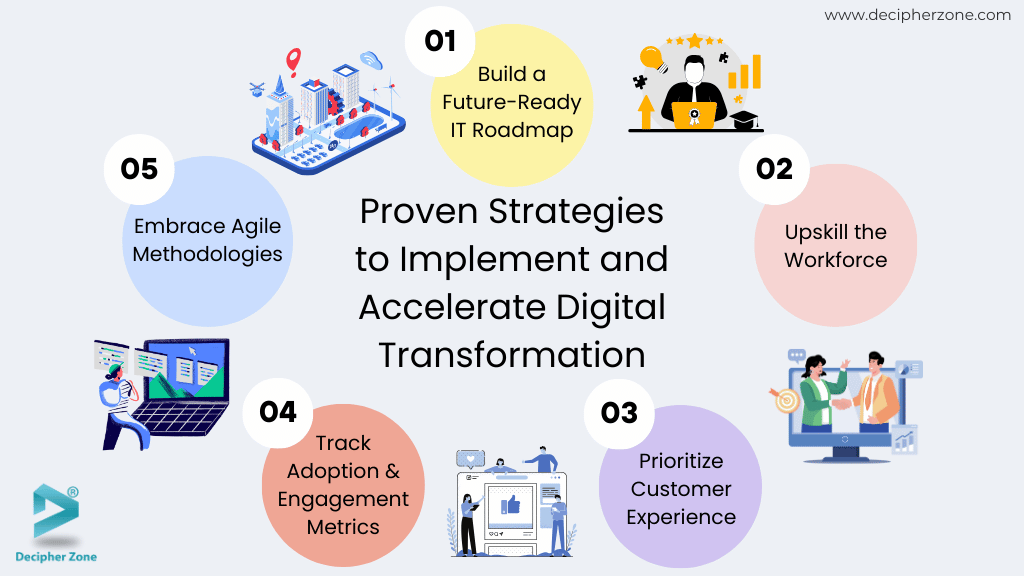
1. Build a Future-Ready IT Roadmap
Align the technology investments with your business goals. Your roadmap can reflect the current needs of your organization while anticipating future trends and customer expectations. You can think beyond infrastructure including scalability, integration and emerging technologies.
2. Upskill the Workforce
Transformation is driven by people rather than solely by technology. Providing employees with the necessary skills to thrive in a digital-first environment, achieving through continuous learning programs and initiatives focused on enhancing digital literacy. By boosting a culture of ongoing education businesses can ensure that their workforce is well-prepared to navigate and excel.
3. Prioritize Customer Experience
Invest in platforms and tools to let customers expect seamless, personalized and fast digital interactions, enhancing user experiences, reducing friction and building loyalty across every digital touchpoint.
4. Track Adoption & Engagement Metrics
Launching new digital tools is not enough, customers must actually use them. By leveraging analytics to monitor engagements, adoption rates and feedback and make improvements accordingly.
5. Embrace Agile Methodologies
Agility in an entire organization allows it to respond faster to market changes. This isn’t just for software teams. This can be possible through iterative processes, cross-functional collaboration and rapid experiments.
Ready to Future-Proof Your Business?
👉 Start Your Transformation Journey Today
6. Invest in Reusable Tools & Processes
Avoid unnecessary duplication of efforts every time you innovate. Instead, focus on creating modular and scalable systems and workflows that can be easily adapted or reused across various department projects. This approach enhances efficiency and boosts collaboration and consistency within an organization.
.avif)
7. Enable Self-Support Tools
Encourage workforce with access to knowledge bases, AI chatbots and performance support systems. This reduces dependency on IT support teams and helps them to speed up issue resolution and productivity.
8. Become a Data-Driven Organization
Collecting meaningful data and extracting insights is difficult. You can build such a culture that uses real-time data and analytics to guide decisions, personalize services and identify growth opportunities.
9. Foster Transparent Communication
Digital transformation approach can be uncertain, open and consistent communication can build trust and keep teams aligned on goals, progress and expectations throughout the business processes.
10. Inspire Innovation at all Levels
Inspire your teams to explore, experiment and challenge the status. This thrives in a culture where innovation is welcomed and expected from mainly leadership.
Accelerating digital transformation is a mindset that requires the right strategy, tools, and culture to flourish in a place. Businesses that foster this mindset can continually adapt, grow, and lead effectively in the digital era.
Read: Digital-First Strategies
Role & Responsibilities of a Digital Transformation Consultant
Here are the key roles and responsibilities and why their guidance can make the difference between success and stagnation:
-
Assess the Current Digital Landscape
-
Develop a Tailored Strategy
-
Implement the Right Solutions
-
Lead Change Management Initiatives
-
Monitor Progress and Optimize
Digital transformation consultants are the experts who work closely with you throughout the process, providing you with the guidance and strategic advice your business needs. This makes it easy for businesses to identify the best technology solutions, design effective digital marketing campaigns and the right technology platforms to implement.
The consultants also help you analyze potential transformation risks and opportunities, leading to better and informed decisions even if your needs are complex.
1. Assess the Current Digital Landscape:
A consultant starts by understanding where you stand and the current situation before charting the course forward. They conduct a comprehensive audit of your:
-
Existing tech infrastructure
-
Digital workflows
-
Customer experience touchpoints
-
Data analytics capabilities
-
Organizational culture and readiness
This analysis provides clarity on what’s working, what’s outdated and where the greatest opportunities for improvement lie.
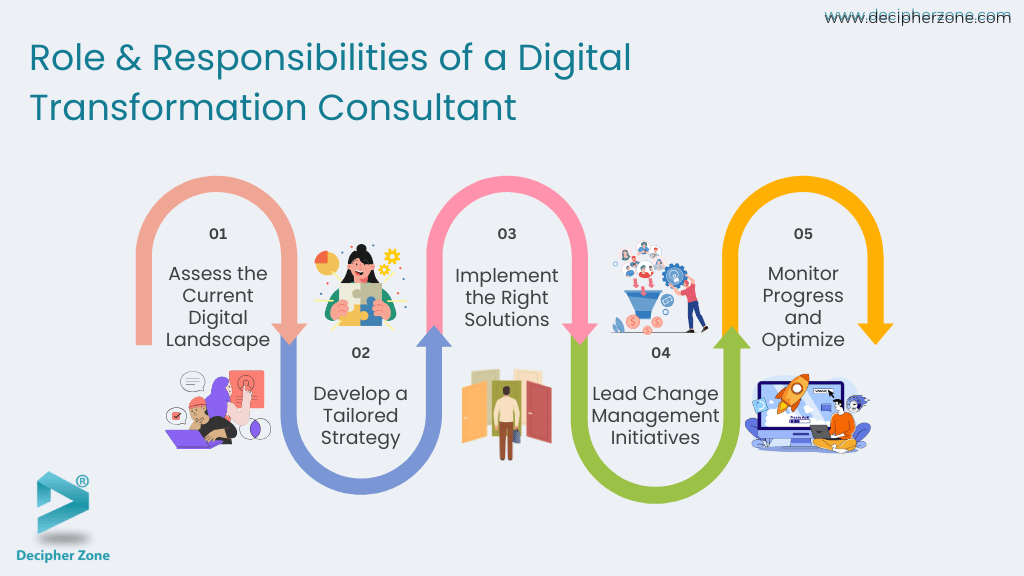
2. Develop a Tailored Strategy
Businesses for a particular niche are not alike nor are their digital journeys. A roadmap is created by the transformation consultant based on the:
-
Business objectives & requirements
-
Market position
-
Customer needs
-
Budget and resources
Making actionable strategic plans including timelines, tech recommendations, KPI frameworks and change management plans, ensuing alignment across the board.
3. Implement the Right Solutions
Digital transformation consultants act as a trusted advisor when it comes to choosing the right tools. Here are the ways:
-
Analyze and choose the right technologies (AI, cloud, IoT, CRM etc)
-
Strategies to integrate with existing systems
-
Streamline digital workflows
-
Secure and comply data
This ensures that businesses can invest in scalable, future-ready software solutions that deliver long-term value.
Embrace innovation and modernize your operations with our end-to-end digital transformation services.
📞 Schedule your free consultation now.
4. Lead Change Management Initiatives
Digital transformation directly affects people which significantly impacts the resistance to change, one of the biggest reasons transformation efforts fail. A consultant offers:
-
Employee training and onboarding strategies
-
Internal communication plans
-
Tools to support leadership alignment
-
Framework with clear change adoption.
5. Monitor Progress and Optimize
The digital consultant remain engaged post-implementation as the the transformation is not a one-time project but a journey:
-
Tracking KPIs and performance metrics
-
Collect feedback from stakeholders
-
Identify and troubleshoot challenges early
-
Mold strategies set real-world outcomes
This involvement ensures the digital transformation efforts stay agile and responsive to new opportunities and challenges.
How Digital Adoption Platforms (DAPs) Works?
Here’s a closer look at how DAPs work:
-
Seamless integration and Smart Overlay
-
Real time In-App Guidance
-
Personalized Learning Paths
-
Data-based Insights and Analytics
Digital Adoption Platforms (DAP) are the powerful tools that sit on top of existing software applications and act as real-time guides. This helps users navigate, learn and maximize the value of the tools at their fingertips. It accelerates adoption and reduces the learning curve by offering in-app training, contextual support and behavior-driven insights.
1. Seamless integration and Smart Overlay
DAPs integrate directly with the existing systems just like CRM systems, ERP platforms, HR tools and more. It offers a function that allows users doesn’t need to leave the platform they are working in to seek help or training.
_Work.avif)
2. Real time In-App Guidance
DAP’s biggest strength is an ability to guide users as they work. Some of the features include:
-
Interactive walkthroughs allow users to complete tasks without confusion.
-
Contextual help like tips and instructions appear based on the real-time actions of the user.
-
Tooltips and pop-ups are available at the moment of need.
-
Automated onboarding flows guide critical processes from the initial stage. This speeds up time to productivity.
3. Personalized Learning Paths
Using digital transformation technologies like AI and machine learning, DAP can tailor training experiences based on the user’s role, skill level and usage patterns. This encourages employees to learn without feeling overwhelmed.
4. Data-based Insights and Analytics
DAP collects data with its interactions, allowing businesses to refine their training programs, optimize workflows and measure ROI on software investment. The data-driven insights includes:
-
Walkthrough completion rates
-
Improvement areas where users get stuck
-
Content which is mostly accessed
-
Feature adoption rates
Read: Top 5 Digital Marketing Trends
How DAPs Support Digital Transformation
DAP is a strategic asset in the digital transformation initiative. Here is how it contributes to prolonged success:
-
Accelerates onboarding regardless of the technical background of new employees.
-
Users feel confident and supported, increasing adoption rates and overall engagement with tools.
-
Users can rely less on IT or help desks with in-built guidance, lowering the support costs.
-
Encouraging ongoing upskilling and adaptability within the workforce.
-
Seamless change management by reducing friction during system upgrades or software rollouts.
Digital Adoption Platforms (DAPs) mainly remove the guesswork from using new technology. This empowers employees, reduces resistance to change and turns digital tools into real business value. This makes DAPs a vital ingredient in any successful digital transformation recipe.
Join global leaders who trust Decipher Zone to deliver smarter digital strategies across industries.
🚀 Let’s Build Your Future Together
Practical Digital Transformation Examples from Major Industries
The list below of industries are bringing digital transformation and reshaping from healthcare to agriculture, adopting new technologies. If you’re an organization, rethink your operations, how you serve customers and stay competitive in this market.
-
Manufacturing
-
Retail
-
Healthcare
-
Finance
-
Education
-
Real Estate
-
Agriculture
-
Transportation & Logistics
Here is explanation of how in detail:
1. Manufacturing (Smart Factories & Predictive Analytics)
Organizations in the manufacturing industry is evolving rapidly with integration of Industry 4.0 to more agile operations, improved product quality and cost efficiency, including:
-
Streamline repetitive tasks with Robotic Process Automation (RPA),
-
Faster prototyping and customized production with 3D Printing,
-
To forecast maintenance needs and reduce downtime with predictive analytics.
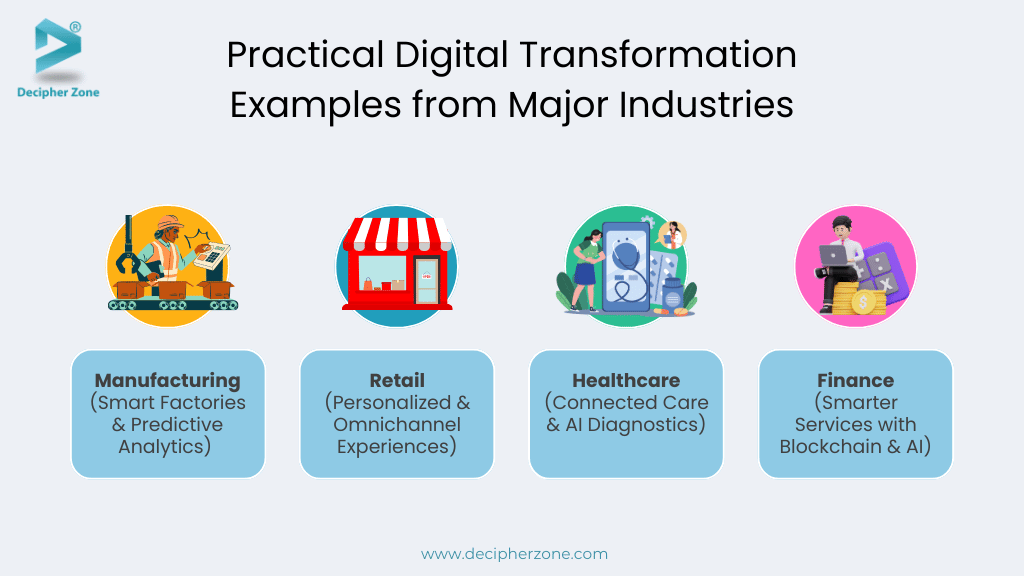
2. Retail (Personalized & Omnichannel Experiences)
Retailers are using digital tools to meet customers consistently and customized to better understand consumer behavior and enhance shopping experiences. Some key strategies are:
-
Seamless mobile apps and e-commerce platforms, offering frictionless and personalized shopping,
-
AI-powered recommendations to increase conversion rates,
-
Real-time supply chain visibility with inventory management systems.
3. Healthcare (Connected Care & AI Diagnostics)
To deliver more efficient and patient-centric services, this digital shift is making healthcare accessible, responsive and data-driven. Some of the transformations include:
-
Virtual consultations and telehealth to improve access to care,
-
EHRs (Electronic Health Records) to streamline data management,
-
AI-driven diagnostics, supporting early disease detection.
4. Finance (Smarter Services with Blockchain & AI)
Digital transformation in financial institutions is all about speed, trust and user empowerment by embracing digital tools, enhancing security, automating tasks and improving user experience.
-
Blockchain for transparent and secure transactions,
-
For personalized financial guidance robo-advisors and AI chatbots,
-
Fraud detection systems driven by ML.
5. Education (Digital Classrooms & Adaptive Learning)
Digital transformation tools offers both educators and learners to deliver flexible and engaging learning experiences, including:
-
Learning management systems for virtual classrooms,
-
For personalized lessons AI-powered adaptive learning tools,
-
EdTech applications that offer gamification learning and boost engagement.
.avif)
6. Real Estate (Virtual Tours & Smart Property Management)
In real estate, digital tools enhances both buyer experience and operational efficiency, leading to faster transactions, including:
-
To bring properties to life remotely, use virtual and augmented reality tours.
-
Platforms for leasing and contract management,
-
IoT-powered smart buildings that monitor energy usage and security systems.
7. Agriculture (Precision Farming & Smart Equipment)
Leveraging digital tools increase yield, reduce waste and make farming more sustainable, including:
-
Monitor soil health can crop conditions with IoT sensors,
-
Aerial imaging and crop analysis with drones,
-
To optimize planting and harvesting schedules using farm management software.
8. Transportation & Logistics (Automation & Real-Time Tracking)
In the logistics industry, digital transformation can provide faster, safer and more reliable movement of goods and people including operations like:
-
AI-driven route optimization to reduce fuel consumption and delivery time,
-
Offers transparency by real-time shipment tracking systems,
-
Mobile apps like self-service portals to enhance customer experience.
Digital technologies offer organizations a future proof value, whether it’s optimizing internal operations, enhancing customer experience or launching entirely new business models. With no time as more industries embrace these changes, the difference between digital laggards and digital leaders will become even clearer.
Read: 4 Types of Blockchain Technology
Explore the Digital Transformation Toolkit from Decipher Zone
Here is our toolkit mini guide to help you innovate, transform and lead:
-
Communication Tools
-
CRM Tools
-
CMS Tools
-
Cloud Storage
-
Project Management Tools
-
Digital Accounting Tools
-
Collaborative Suites
-
Intranet Platforms
-
Recruitment Management Tools
-
Payroll Management Tools
Our Digital transformation Toolkit can turn challenges into strategic growth opportunities, streamlining the journey with a full suite of tools and technologies we directly integrate into your custom applications as per your unique requirements.
1. Communication Tools:
The tools we integrate include real-time messaging, video conferencing and virtual collaboration platforms to not only enhance team productivity but also streamline client interactions. With these tools, we allow businesses to overcome geographic barriers, accelerate decisions and develop a collaborative culture across rem0te and hybrid teams.
-
Slack, Microsoft Teams, Google Chat for team messaging and integrations,
-
Zoom, Google Meet for seamless in-person virtual meetings,
-
Miro, Mural for brainstorming and whiteboards virtually.
2. CRM Tools:
Our CRM integrations help you nurture long-term customer relationships with managing leads, personalize customer experience and gain valuable insights for smarter lases and marketing. Here are the tools mainly we integrate:
-
Salesforce for full cycle customer management for business level,
-
Hubspot for marketing automation and CRM,
-
Zoho CRM for customizable CRM with sales, support and analytics.
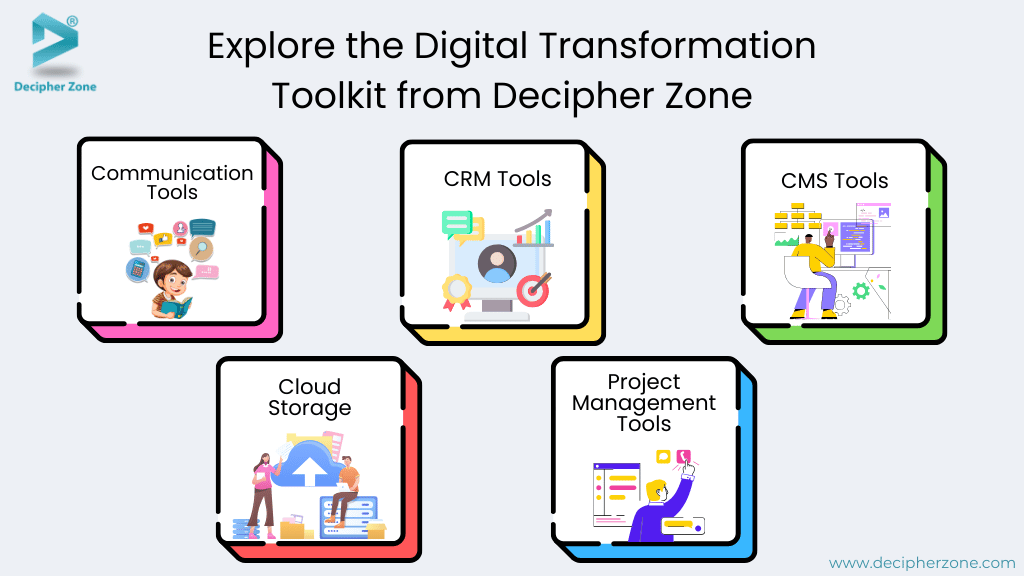
3. CMS Tools:
Implementing CMS solutions makes it easy for teams to publish, update and manage digital content where no technical expertise is required. We as a team ensure your CMS is scalable, secure and aligned with the brand requirements. This improves content strategy across channels.
-
WordPress for highly customizable and user-friendly CMS,
-
Drupal for scalable CMS for enterprise-level websites,
-
AEM (Adobe Experience Manager) for high-end CMS for personalized digital experiences.
4. Cloud Storage:
With our cloud storage integrations, Decipher Zone keeps your data accessible, always secure and scalable, helping businesses to move to the cloud with minimal disruption and maximum flexibility. Here are the tools for easy access, secure sharing and real-time collaboration:
-
Google Drive,
-
Dropbox,
-
Microsoft OneDrive
5. Project Management Tools:
Our team of experts integrate top-tier project management tools, enhancing clarity, accountability and speed to your digital initiatives. This not only keeps tema aligned but helps them achieve milestones and deliver faster.
-
Jira for agile software development
-
Trello for visual task tracking with Kanban boards.
-
Asana for streamlined task management and timelines.
6. Digital Accounting Tools
We set up accounting integrations that give business the financial visibility and accuracy to manage invoices, expenses and compliance effortlessly. Here are the tools we integrate:
-
QuickBooks,
-
Xero,
-
FreshBooks for recordkeeping, payroll, tax and financial reporting.
7. Collaborative Suites:
Our team implements powerful productivity suites that centralize work, documents and communication to keep your teams connected and efficient. DZ ensures the teams have what they need to work smarter and together either they’re on site or remote. Microsoft office 365, Google Workspace, Zoho Workplace are the tools we integrate for editing, sharing, emailing and cloud storage.
.avif)
8. Intranet Platforms:
Intranet are not just portals but platforms allowing internal communication, knowledge sharing and employee engagement. Our team will help you build an intranet that aligns culture, communication and productivity. SharePoint, Igloo Software, Unity are the tools we integrate for resource sharing, internal collaboration and document management.
9. Recruitment Management Tools
Our recruitment tools help you streamline the hiring process with automation and data-based insights, making hiring becomes faster, smarter and more candidate friendly. Greenhouse, Workday Lever are the tools we integrate for sourcing, screening and onboarding candidates.
10. Payroll Management Tools:
DZ helps integrate reliable payroll systems to automate compensation, tax compliance and employee benefits, ensuring payroll is accurate, compliant and hassle-free on every pay cycle. ADP Workforce Now, Gusto, Paychex Flex are the tools we integrate for error-free payroll processing and reporting.
5 Types of Digital Transformation
Here are the types of digital transformation and how they can work together to explore the new values:
-
Business Process Transformation
-
Business Model Transformation
-
Domain Transformation
-
Cultural & Organizational Transformation
-
Cloud Transformation
To leverage digital transformation services efficiently, businesses must understand the different types of transformation and how they can work together to truly embrace the digital future.
1. Business Process Transformation
Whether it’s automating repetitive tasks, optimizing workflows or breaking down silos across departments, business process transformation reinvent the way your business operates internally. Mainly it aims to enhance efficiency, reduce costs and improve speed. Think of it as giving operations a digital upgrade that delivers faster, and smarter results.
Key Examples:
-
Implementing AI-powered chatbots for customer support,
-
To integrate processes across locations, use cloud-based platforms,
-
Automating invoice processing and inventory management.
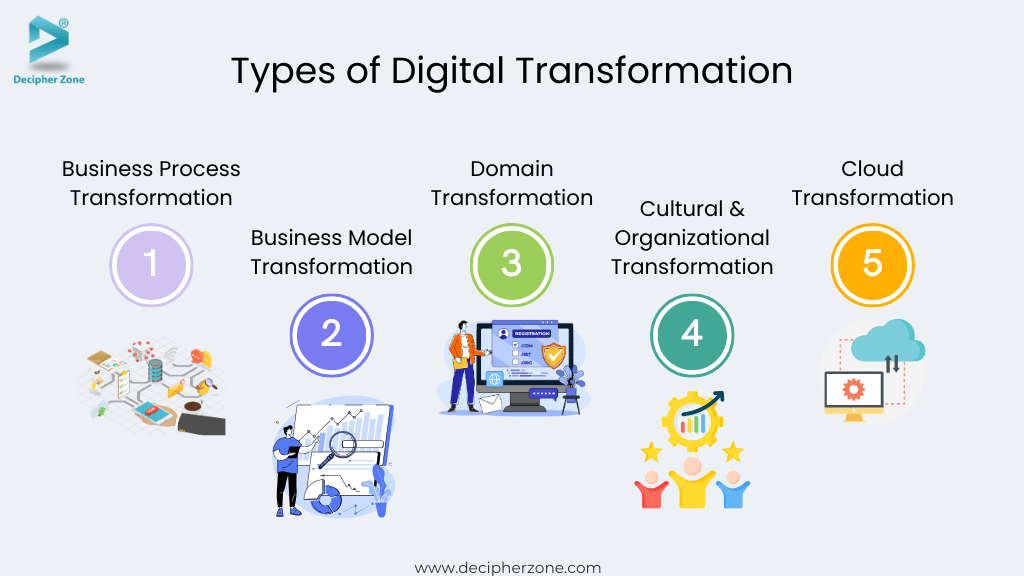
2. Business Model Transformation
Business Model Transformation is all about how your business operates at its core. It involves rethinking the way business generates revenue, mainly through innovative use of technology. The way you create value can be just as crucial as the product or services you provide.
Key Examples:
-
Subscription based models like Netflix or Adobe,
-
Digital platforms like telehealth apps or online fitness training,
-
Leveraging data to create monetization streams like selling insights or APIs.
3. Domain Transformation
Digital transformation uses technology that allows businesses to launch in new markets or create new product lines. In domain transformation, technologies are used to redefine your brand’s scope and discover new areas of growth beyond your traditional offerings. This is not only just evolving but also expanding your identity.
Key Examples:
-
Amazon expands from online retail to cloud computing with AWS.
-
Businesses developing its own route optimization SaaS platforms,
-
Manufacturers offering mobility services like car-sharing or EV charging apps.
4. Cultural & Organizational Transformation
Cultural transformation focuses on changing the organization's DNA, led by people who are willing to adapt, learn and grow. While digital tools are important, they can truly thrive with the right mindset in place and not just by technology alone. This transformation promotes agility, collaboration and innovation across every level of the organization.
Our consultants will help assess, strategize, and execute your roadmap for success.
💡 Get expert guidance with a free strategy session.
Key Examples:
-
Embracing rapid iterations and experimentation,
-
Encouraging teams and decentralizing decision making,
-
Boosting digital-first data-powered work culture.
5. Cloud Transformation
Cloud transformation involves moving infrastructure, platforms and software to the cloud to promote scalability, security and accessibility, making it more agile, cost-effective and future-ready. It has become the backbone of modern digital evolution by removing the limitations of traditional systems.
Key Examples:
-
Remote access to resources and real-time collaboration,
-
Enhances disaster recovery and data security.
-
Reduced IT overhead and better uptime.
Read: Hiring a Software Development Company
Looking for a Digital Partner? Here’s Why Decipher Zone Stands Out
Whether you are looking to modernize operations, reimagine customer experiences or scale with cloud technology, Decipher Zone brings a robust combination of expertise, agility and client-first innovation to the table.
Here is why DZ is the right choice for you and lead your organization with digital transformation initiatives:
1. Custom-Made Solutions
We deeply understand business goals, challenges and industry dynamics to develop customized digital strategies that not only deliver but leave a real impact. From developing a robust SaaS product to optimizing logistics workflow, our software solutions are built around your success.
2. Agile, Fast & Scalable Development
Our team ensures speed and flexibility while opting for an agile development process which leads to faster time-to-market, real-time collaboration and the ability to pivot when the business needs change. We help you stay ahead with the scalable architecture and iterative development.
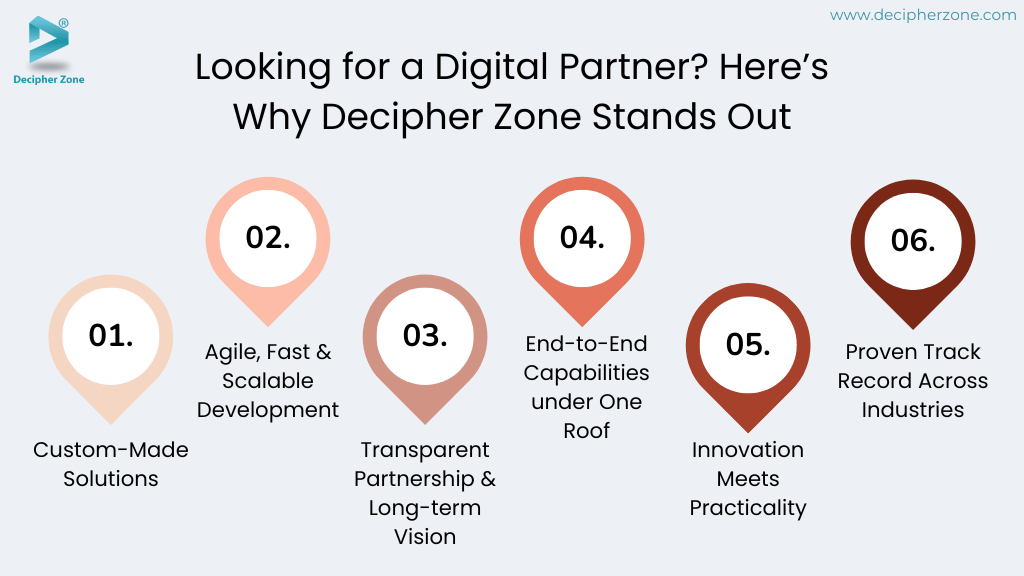
3. Transparent partnership & Long-term Vision
Our clients see us not just as a vendor but a strategic digital partner committed to long-term growth. From the initial planning to post-launch support we build relationships and offer open communication, ongoing collaboration and total transparency, not just delivering the product.
4. End-to-End Capabilities under One Roof
Digital transformation has multiple parts and our experts handle them all efficiently and ensure seamless integration across every touchpoint. From UI/UX design, cloud computing, mobile apps, to enterprise software our full-stack tech team helps you with fewer vendors, less friction and better outcomes.
5. Innovation Meets Practicality
Innovation is all about choosing the right and latest technologies and combining them to solve your real-world challenges. AI, cloud, blockchain, IoT with practical business-first approach can build secure, scalable and cost effective solutions.
6. Proven Track Record Across Industries
Our team at Decipher Zone has delivered success across eCommerce, education, finance, hospitality, healthcare, logistics and more. Our work, dedication, testimonials, and long standing client relationships speaks for itself.
Let’s get connected before it's too late to innovate with digital transformation services. Look for trusted partners like Decipher Zone who listens, adapts and delivers results that matter. We are here to be your trusted partner, get in touch today for free consultation and start your digital transformation journey.
FAQs
What are digital transformation services?
Digital transformation services enable businesses to adapt and thrive in the digital age, leveraging technology to reshape processes, operations and customer experiences. These services are designed to take the headache of digital transformation and ensure that the organization can focus on other important parts of the business which is ‘Strategy’.
What are digital transformation strategies?
Opting the best and right trend and technology is crucial, these digital transformation strategies include
-
Build a Future-Ready IT Roadmap
-
Upskill the Workforce
-
Prioritize Customer Experience
-
Track Adoption & Engagement Metrics
-
Embrace Agile Methodologies
-
Invest in Reusable Tools & Processes
-
Enable Self-Support Tools
-
Become a Data-Driven Organization
-
Foster Transparent Communication
-
Inspire Innovation at all Levels
What are digital transformation tools?
There are various technologies and platforms as digital transformation tools including CRM, cloud computing, communication tools, etc. These tools facilitate and support the process, improving processes, enhancing customer experience and driving business growth. Decipher Zone has introduced its own toolkit that helps businesses innovate, transform and lead.
How much does it cost for digital transformation for businesses?
The cost for digital transformation for businesses varies depending on factors including company size, scope of transformation, type of technology, implementation costs, consulting and professional services and training and change management. Although the cost for businesses is $40,000 to $600,000 and developing a digital platform can range from $4,000 to $200,000 and more depending on the complexity.
With 70% of digital transformations failing due to poor execution, partner with experts who get it right the first time.
🔐 Connect with Decipher Zone — Your Trusted Digital Partner.

